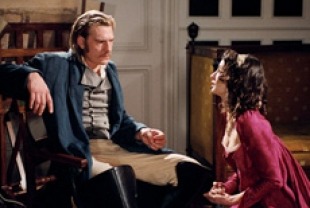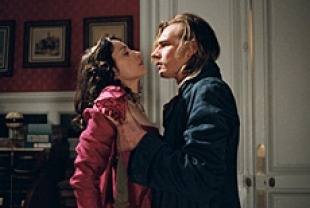Jacques Rivette began his film career as a cameraman for Francois Truffaut and Eric Rohmer and is known as a French New Wave master (La Belle Noiseuse, Va Savoir). This sophisticated drama has been adapted from the novella The Duchesse de Langeais, which is part of Honore de Balzac's La Comedie Humaine.
Armand de Montriveau (Guillaume Depardieu) is a handsome and famous Napoleonic war hero who has many stories to tell about his close encounters with death. He has little respect or familiarity with the mores of Restoration society in 1820s Paris. Antoinette de Langeais (Jeanne Balibar), a married socialite, becomes fascinated with this mysterious outsider who is very different from those who frequent the balls in the city. When she gets him alone, he tells her about his experiences as a prisoner in Africa for two years. Madame de Langeais is a proficient practitioner of seduction, and she spins a web to ensnare the general. After spending only a brief time with her, he wants her as his lover. She refuses physical intimacy but agrees to see him on a regular basis.
Director Jacques Rivette is fascinated with the small details of the complicated romantic relationship between the General and the Parisian socialite. The Duchess takes great pleasure in the attention and the devotion of the earnest and brooding soldier. She sets up each encounter at her home as if she were directing a play with herself as the main character. She makes sure that her clothing and the room lighting are just right to insure the perfect mood. She has perfected the nuances of the coquette who knows how much skin to reveal and how much to cover up.
But there is a limit to the General's patience and whenever he asserts his will to dominate her, she retaliates with a new move of her own. But he stages his own surprising drama for her. The finale challenges us to again ponder the value of sexual politics where men and women clash with each other in the name of love and usually allow ego to get the upper hand.

